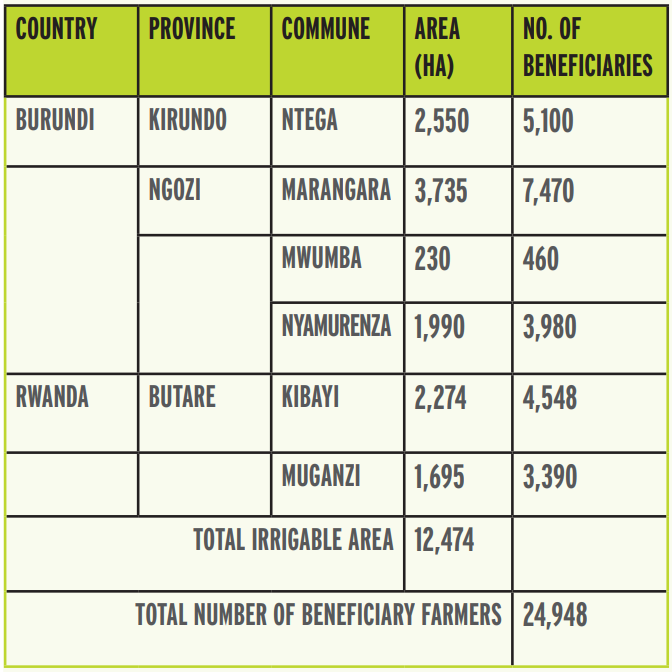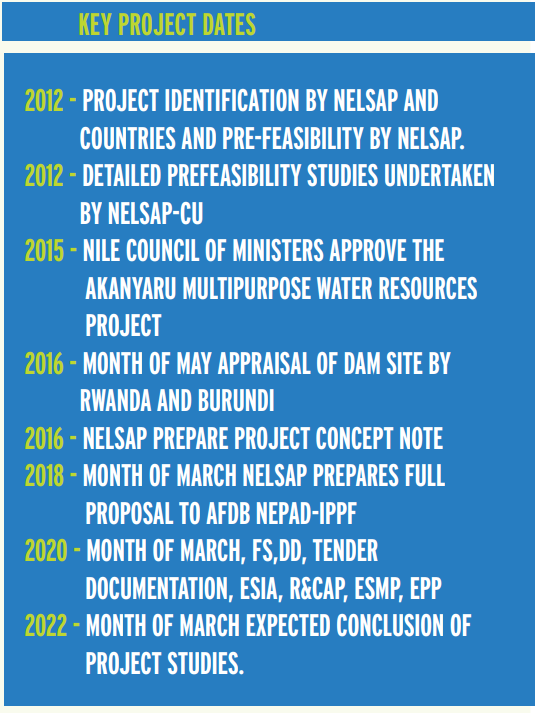The Akanyaru Multipurpose Water Resources Development Project that will be shared between Burundi and Rwanda is located on the trans-boundary Akanyaru River. Akanyaru River is part of the Kagera River basin that forms part of the Lake Victoria Basin. The proposed project is located along the transboundary Akanyaru River which defines the border between the Southern Province of Rwanda and Burundi’s Ngozi Province.
The project comprises a 52m high dam with storage capacity of 333 million cubic metres that will supply water to 614,200 people and irrigate 12,474 ha directly benefitting 24,948 farmers. It will also generate 14.5 MW hydropower, which will power 141,111 homes and serve 846,000 people.
The project also includes restoration of degraded watersheds upstream of the dam. This project, classified under agriculture, hydropower, natural resources, watershed management and water supply sectors was identified in 2012 by Rwanda and Burundi with support from NELSAP-CU. NELSAP-CU undertook the detailed identification studies in 2012 with financing from a Sweden-Norway grant.
In 2016 NELSAP-CU prepared a Project Concept Note and did a full proposal in March 2018 for funding from the AfDB NEPAD-IPPF. The Akanyaru project is part of the Nile River Basin investment programmes prioritised by Burundi and Rwanda. The Akanyaru project was among the transboundary projects that were approved by the Nile Equatorial Lakes Council of Ministries (NELCOM) meeting held in Entebbe, Uganda on 13th October 2015.
In addition to power generation, water supply and irrigation, the project will contribute to development of other auxiliary water uses such as livestock development, employment creation, flood control environmental protection and watershed management, boosted agricultural production to match the ever increasing human populations and market demand at regional level thereby improving both national and regional food security, social economic development and ultimately poverty reduction.

Burundi and Rwanda will formulate a Regional Project Steering Committee (RPSC) which will be composed of permanent/principal secretaries from the ministries responsible for water, irrigation, agriculture and finance in both countries. The RPSC will co-opt other members as needed.
The RPSC will act as in advisory role and offer strategic guidance to the project. The primary responsibilities of the RPSC will be to approve the project work plans, budgets and procurement plans, provide linkages with the relevant national institutions and project cycles to ensure counterpart support to the project.
In addition, the committee will facilitate joint agreements, linkages and report to the relevant ministries in the participating countries as well as coordinate the implementation of the project and its prioritisation in the participating countries’ National Development Plans (NDPs). RPSC Chair will be rotational, alternating between the permanent/principal secretaries of both countries on an annual basis.

NELSAP-CU will form an International / Regional Dam Safety Panel of Experts (DSPoE) comprising a hydrology expert, geological/geotechnical expert and dam design/construction engineering expert. The purpose of the DSPoE will be to review and advise NELSAP on matters related to dam safety and other critical aspects of the dam, its appurtenant structures, the catchment area, the reservoir rim, project formulation; technical design; construction procedures; and associated works such as power facilities, river diversion during construction and fish passages.
NELSAP will contract the services of the panel, provide administrative support for the panel‘s activities and arrange for semi-annual panel meetings and reviews, which will continue through the investigation, design, construction, and initial filling and start-up phases of the dam.
After each meeting, the Panel will provide a report of its conclusions/recommendations, signed by the Panel of Expert (PoE) Chairperson. Following the filling of the reservoirs and start-up of the dam and barring significant difficulties, NELSAP will disband the Panel.

A preliminary Environmental and Social Impact Assessment was undertaken as part of the pre-feasibility studies and flagged key issues related to biophysical environmental, socio-economic environment, as well as policy, legal and institutional environment was completed. Other planned activities include;
- Full feasibility studies, detailed design and preparation of tender documents for the project.
- Independent Environment and Social Impact Assessment (ESIA) and Resettlement Action Plan.
- Creation of a Dam Safety Panel of Experts (DSPoE)
- Formulation of a Regional Project Steering Committee.
Early November 2019, NELSAP-CU hosted a team from the AfDB NEPAD-IPPF (Infrastructure Project Preparation Facility) and from the African Water Facility (AWF) for an appraisal mission in Rwanda to discuss modalities for the financing of this project and to get country commitment on the same.
“Rwanda commends NELSAP-CU for following up on this project all the way from identification, prefeasibility and now full feasibility,” said Ms. Fatina Mukarubibi, the Rwanda Permanent Secretary in the Ministry of Environment. She was speaking during the AfDB / NEPAD-IPPF appraisal mission.
Speaking during the Nile Equatorial Lakes Council of Meeting (NELCOM) on 29th November 2019 in Nairobi, Hon. Deo-Guide Rurema, the Burundi Minister for Environment, Agriculture and Livestock, reiterated his country’s commitment to the Akanyaru project and confirmed that through coordination of NELSAP-CU, the two countries would soon be signing an MOU on its implementation.
“Following review and technical screening of the Akanyaru project, it was found to present a strong case for socio-economic development in the sub-pregion because it will address food, water and energy security, and contribute to economic development, thus the project is eligible for NEPAD-IPPF and AWF support and has accordingly been included in the 2019 Work Programme for preparation,” said Mr. Mtchera Johannes Chirwa, Chief Infrastructure and PPP Specialist from the AfDB’s NEPAD-IPPF.
Burundi and Rwanda formally mandated NELSAP-CU to prepare the project into full feasibility, and to conduct on their behalf, detailed design, tender documents preparation, environmental and social impact assessment (ESIA) and a resettlement action plan (RAP).

